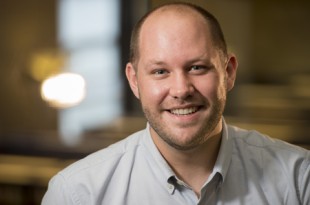David Ruth
713-348-6327
david@rice.edu
Jade Boyd
713-348-6778
jadeboyd@rice.edu
OpenStax takes ‘personalized’ learning to college
OpenStax selected by Bill & Melinda Gates Foundation for Courseware Challenge
HOUSTON — (Sept. 30, 2014) — Rice University-based nonprofit OpenStax, which has already provided free textbooks to hundreds of thousands of college students, has been chosen by the Bill & Melinda Gates Foundation to develop personalized courseware for college students as part of the foundation’s $20 million Next Generation Courseware Challenge.
 OpenStax is one of seven competition finalists announced by the Gates Foundation today in Orlando, Fla., at EDUCAUSE 2014, the leading annual conference for IT leaders and professionals committed to advancing higher education.
OpenStax is one of seven competition finalists announced by the Gates Foundation today in Orlando, Fla., at EDUCAUSE 2014, the leading annual conference for IT leaders and professionals committed to advancing higher education.
“The same technology that retailers and online search firms use to deliver personalized choices can also be used to deliver personalized learning experiences for college students,” said OpenStax founder Richard Baraniuk, Rice’s Victor E. Cameron Professor of Engineering. “Our free textbooks are already making college more accessible for those who couldn’t otherwise afford it, and personalized learning technology will improve student learning outcomes as well.”
Baraniuk said OpenStax’s personalized learning technology will pinpoint areas where students need more assistance, and it will react by delivering specific content to reinforce concepts in those areas. The personalized books will deliver tailored lessons that allow individual students to learn at their own pace. For example, faster learners could receive lessons that are streamlined and compact, and struggling students could be given more supplemental material and additional learning exercises.
OpenStax began as an open educational resource repository in 1999 and is best known for its higher-education publishing division, OpenStax College, which uses philanthropic gifts to produce high-quality, peer-reviewed textbooks for the nation’s most-attended college courses. OpenStax College textbooks are free online and low-cost in print, and the first seven books have already saved students nearly $30 million.
In May, more than 100 digital learning innovators were invited to participate in the Next Generation Courseware Challenge. Participants were asked to develop digital courseware that personalizes instruction, with the goal of helping low-income and disadvantaged undergraduates succeed in high-enrollment college courses. OpenStax was among 51 organizations that applied for the challenge.
“Students learn best when education is personalized to their needs and goals,” said Daniel Greenstein, director of postsecondary success at the foundation. “There is a growing body of evidence that courseware, when integrated effectively by faculty in instruction, can personalize learning at unprecedented scale, potentially enabling all students — not just those who are able to attend the most elite, expensive colleges — to get the best and most effective education at a reasonable price.
“Since 2008, the foundation has invested more than $60 million to accelerate the development of great courseware and worked with faculty to advance our understanding about how to use it well in support of undergraduate education,” Greenstein noted. “This latest round of investments represents our belief that a new generation of courseware is beginning to emerge with capabilities that will have tremendous benefits for students and faculty and enable colleges and universities to more effectively advance their educational missions.”
OpenStax Managing Director Daniel Williamson said the new funding will enable OpenStax to harness the latest research in cognitive science and machine-learning algorithms to customize learning experiences for college students. As part of the challenge grant, OpenStax plans to combine the new personalized learning technology with some of its upcoming titles.
In August, OpenStax launched a two-year effort to pioneer personalized digital textbooks for K-12 education. That program, which is funded by a $9 million grant from the Laura and John Arnold Foundation (LJAF), will combine personalized learning technology with content from two popular OpenStax College titles — Concepts of Biology and College Physics — to create personalized textbooks for both high school physics and Advanced Placement biology.
OpenStax is a nonprofit initiative of Rice University and is made possible by the support of the Gates Foundation, LJAF, the William and Flora Hewlett Foundation, the 20 Million Minds Foundation, the Maxfield Foundation, the Calvin K. Kanzanjian Foundation and the Leon Lowenstein Foundation. For more information, visit http://openstaxcollege.org.
-30-
VIDEO is available at:
OpenStax developing textbooks that deliver personalized learning
High-resolution IMAGES are available for download at:
https://news2.rice.edu/files/2014/09/0929_OSX-quad103-lg.jpg
CAPTION: Rice University-based nonprofit OpenStax has been chosen by the Bill & Melinda Gates Foundation to develop personalized courseware for college students.
CREDIT: Jeff Fitlow/Rice University
https://news2.rice.edu/files/2014/09/0929_OSX-quad98-lg.jpg
CAPTION: OpenStax College textbooks are free online, low-cost in print, and have already saved students more than $30 million.
CREDIT: Jeff Fitlow/Rice University
https://news2.rice.edu/files/2013/04/0501-LJAF-OpenStax-5books-lg.jpg
CAPTION: OpenStax College founder Rich Baraniuk displays some of the publisher’s free textbooks.
CREDIT: Jeff Fitlow/Rice University
https://news2.rice.edu/files/2014/07/0805_OSX-K12-rich-lg.jpg
CAPTION: Richard Baraniuk
CREDIT: Jeff Fitlow/Rice University
https://news2.rice.edu/files/2014/08/0805_OSX-K12-daniel2-lg.jpg
CAPTION: Daniel Williamson
CREDIT: Jeff Fitlow/Rice University
Located on a 300-acre forested campus in Houston, Rice University is consistently ranked among the nation’s top 20 universities by U.S. News & World Report. Rice has highly respected schools of Architecture, Business, Continuing Studies, Engineering, Humanities, Music, Natural Sciences and Social Sciences and is home to the Baker Institute for Public Policy. With 3,920 undergraduates and 2,567 graduate students, Rice’s undergraduate student-to-faculty ratio is just over 6-to-1. Its residential college system builds close-knit communities and lifelong friendships, just one reason why Rice has been ranked No. 1 for best quality of life multiple times by the Princeton Review and No. 2 for “best value” among private universities by Kiplinger’s Personal Finance. To read “What they’re saying about Rice,” go here.



